San Francisco Giants: Warming the hot seat, which GM could go next?

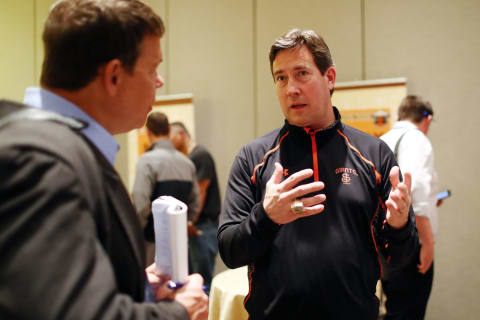
With Bobby Evans’ departure from the San Francisco Giants, which general managers might be next?
The dismissal of Bobby Evans as general manager of the San Francisco Giants is a clear reminder that managers aren’t the only ones likely to lose their jobs over the next couple of weeks.
There were only two new general managers in 2018, and only one replaced a GM fired following the 2017 season. Alex Anthopoulos took over in Atlanta following the forced removal of John Coppolella in the aftermath of a scandal involving the improper signing of international players. Nick Krall was promoted to GM in Cincinnati following the organizational elevation of his predecessor.
But that small amount of GM turnover is unusual. Following the 2016 season, four new general managers were named. Red Sox President Dave Dombrowski appointed himself general manager replacing Mike Hazen, who had moved to Arizona to succeed Dave Stewart. In Tampa-St. Petersburg, Eric Neander succeeded Matt Silverman when Silverman was elevated to president of baseball operations. Thad Levine was appointed general manager of the Minnesota Twins in November of 2016, succeeding Terry Ryan, who had retired.
There were nine new GM appointees following both the 2014 and 2015 seasons.
Evans’ removal creates the second GM opening of 2018, following the illness-driven resignation earlier this year of Mets general manager Sandy Alderson. The Mets have been operated since then by a management consortium. But additional resignations or forced removals are not at all out of the question. Here’s a look at why at least a few general managers should be nervous heading into the 2018-19 off-season.
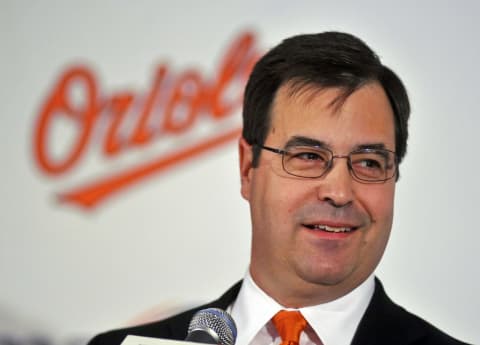
Baltimore Orioles
Dan Duquette has served as general manager of the Orioles since November of 2011. During his tenure, the O’s have three times reached post-season play, and Duquette was named Sporting News executive of the year in 2014.
But their sub .300 winning percentage in 2018 means the Orioles – who were 89-73 in 2016 – are likely to have lost 40 games in the standings in the two subsequent seasons. They’ve also failed to retain much of the heart of their roster, notably Manny Machado, who was traded to Los Angeles in July.
His contract expires this season, making Duquette easily removable. Rumors, as yet unconfirmed, of the imminent departure of field manager Buck Showalter — widely perceived as Duquette’s alter ego — are also a bad sign.
A potential third strike against Duquette might be his failed efforts following the 2014 season to escape Baltimore for a more lucrative deal in Toronto. Orioles owner Peter Angelos nixed that move when Toronto failed to offer Baltimore what Angelos deemed sufficient compensation for Duquette.
Entering the final week of the 2018 season, the Orioles were 567-563 under Duquette’s oversight.
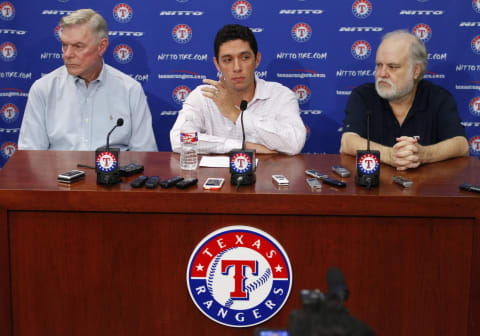
Texas Rangers
In October of 2005, Jon Daniels, only 28 at the time, replaced John Hart as general manager of the Rangers. Among current GMs, that makes him second in seniority behind only the Yankees’ Brian Cashman.
During his tenure, the Rangers have played in five post-seasons, reaching the 2010 and 2011 World Series. He has a career .515 winning percentage.
But Texas has suffered through successive disastrous seasons in 2017 and 2018, finishing in the AL West basement this season. Its most marketable player, veteran third baseman Adrian Beltre, is rumored to be on the verge of retirement. Attendance is also down about 600,000 from two seasons ago.
Daniels’ firing this week of field manager Jeff Banister may suggest that he will be given additional time to rebuild the franchise. It seems unlikely that the team’s ownership would allow him to fire the field manager if it viewed Daniels’ own departure as imminent. Unless, of course, the team’s ownership viewed Banister’s departure as the first stage of a two-stage restructuring.
That’s entirely possible because, like Duquette, Daniels’ contract expires at season’s end. That in itself is ominous because the Rangers have twice previously signed Daniels to multi-year deals well in advance of the expiration of his existing contract.
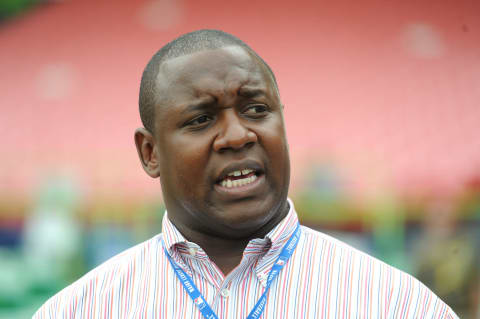
Miami Marlins
As a legacy from the previous administration now working under new ownership, Marlins general manager Mike Hill can’t feel too comfortable.
His contract may provide some security, although that in itself is something of a state secret. The terms of Hill’s working agreement with the Marlins have never been precisely spelled out; it is believed to continue at least through 2020 for an undisclosed amount.
That might make it more difficult for principal owner Bruce Sherman and CEO Derek Jeter to restructure the front office team they inherited when they bought the team last season. But as much change as Sherman and Jeter have already brought to Florida, nothing can be ruled out.
Hill came to the Marlins in 2003, and served as general manager from 2007 through 2013, when he was promoted to president of baseball operations. He still holds that title, but re-assumed GM responsibilities as well when the Marlins merged the two positions in May of 2015. The Marlins had a .463 winning percentage during Hill’s first GM tenure; they’ve been .456 since he began pulling double duty in 2016.
Assuming Sherman and Jeter want to put more of their own stamp on the team’s operations, one way to do so would be for Jeter to appoint a new general manager and kick Hill upstairs into a full-time presidential role that would amount to a sinecure position.
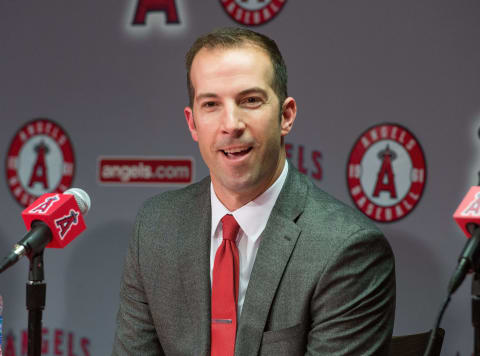
Los Angeles Angels
When Arte Moreno hired Billy Eppler to run the Angels front office following the 2015 season, Moreno gave Eppler a four-year contract. That deal enters its final year this October, meaning that Eppler’s status becomes a bit more tenuous with every day he does not receive an extension.
In fairness to Eppler, he inherited a roster full of contractual commitments, including the non-productive half of a 10-year, $240 million deal with Albert Pujols, and a totally productive 6-year deal with Mike Trout that continues through 2020. His most substantial impacts have probably been the 2016 trade that brought All-Star shortstop Andrelton Simmons and the free agent signings of Japanese star Shohei Ohtani and free agent outfielder Justin Upton.
The reality, however, is that the Angels have disappointed under Eppler. As of the end of the 2018 season, they will have been under .500 for three straight seasons, and will have finished more than 20 games out of the AL West lead in each of those seasons.
Moreno, who has owned the Angels since 2003, has never been change-averse. He hired Tony Regains in 2008, Jerry DiPoto four years later and Eppler four years after that. Strictly going by the numbers, that gives Eppler one more season to turn the Angels around.
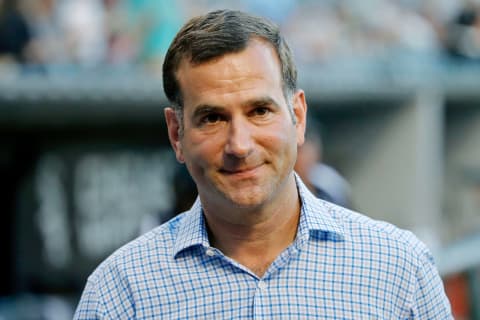
Chicago White Sox
Even before being promoted from his assistant’s role to White Sox GM in 2013, Rick Hahn was perceived to be on solid footing on the South Side.
As recently as a year ago, the perception among Sox fans was of Hahn as the savant who negotiated trades that filled Chicago’s prospect cupboard to overflowing: Lucas Giolito, Yoan Moncada, Michael Kopech, Reynaldo Lopez, Eloy Jimenez, Ian Clarkin.
To this point, for the most part, those prospects remain just that – prospects. Lopez, Moncada and Giolito are all Sox regulars, but Moncada is carrying a batting average in the .230s while Giolito has a 5.81 ERA. Lopez, 7-9 with a 3.94 ERA to date, has delivered the most actual performance. Kopech, meanwhile, is out until (at least) 2020 recovering from arm surgery, while Clarkin and Jimenez remain in Triple A.
The question, then, becomes the limit – if any – of the patience of team president Kenny Williams and owner Jerry Reinsdorf. If they remain as positive as Sox fans all of those kids are future stars and the team’s true salad days are immediately on the horizon, then Hahn is probably on solid turf.
Why wouldn’t Williams and/or Reinsdorf come to that conclusion? The team’s record is one reason. Since Hahn’s promotion, the White Sox have not had a single winning season, much less played a post-season game, and have not finished higher than fourth in the AL Central. His winning percentage is .433.
Attendance may also be a nettle. The White Sox will draw fewer than 1.6 million fans this season, their smallest attendance in nearly two decades and their third straight season of decline. In the last pre-Hahn season, 2012, the Sox drew 1.97 million, a figure they haven’t approached since.
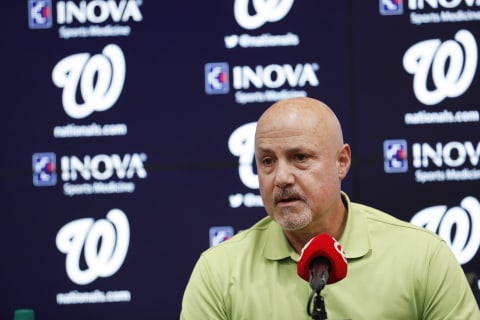
Mike Rizzo
Mike Rizzo was named general manager of the Washington Nationals prior to the 2010 season. The Nats were terrible, but Rizzo fired field manager Jim Riggleman and hired Davey Johnson, who needed just one season to take them to the NL East throne room.
When Johnson failed to repeat, Rizzo fired him and hired Matt Williams, who promptly took the Nats to a second NL East title.
When Williams failed to repeat in 2015, Rizzo diagnosed he problem as the manager’s too-hot competitive fire. He fired Williams and replaced him with the ultra-easy going Dusty Baker, who took the Nats to consecutive NL East titles in 2016 and 2017.
But when Williams failed to win a post-season series, Rizzo fired him and brought in Dave Martinez. This past April Nationals ownership signed Rizzo to a two-year extension, everybody affiliated with the team assuming they would breeze to a third straight divisional title and — probably, hopefully, maybe if the fates allowed — actually win a post-season series or three.
Obviously, that didn’t happen.
Next. Evans out as Giants GM. dark
The new two-year deal may insulate Rizzo from the prospect of team owner Ted Lerner turning the executioner’s axe on his GM. But given the consistency with which expectations have exceeded reality in Washington, it’s not out of the question that Martinez will be Rizzo’s last manager hiring, especially seeing one of the most consistent jobs in the San Francisco Giants suddenly in flux.